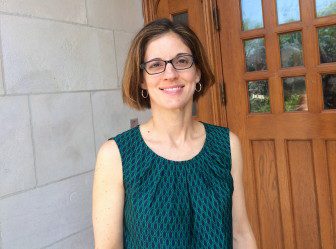“It’s important to separate specific incidents from the larger issues we have,” said Columbia High School Principal Elizabeth Aaron on Monday, following a challenging week that saw a spate of student fights and one student arrested for weapons possession.
In a phone interview with The Village Green, Aaron spoke candidly and at length about student altercations, debunking some of the rumors that were swirling about rampant fighting both on and off school grounds. The fights took place before an incident Thursday when a student was taken into custody after bringing an airsoft gun and kitchen knife to school.
Aaron also addressed the rumors in a letter sent to the community, and at the Town Hall meeting on June 8 on school safety. In the phone interview, which took place before the Town Hall, Aaron clarified that the school “managed four incidents” last week where students engaged in physical altercations. There was also a fifth incident unrelated to the other four.
The fights were not confined to just one grade and did “not necessarily” involve the same students. In some cases, she said, students egged each other on. “We were disappointed” in those students’ behavior, said Aaron.
Aaron said she and the administration were particularly concerned that some students videotaped the fights and shared them on social media. “Videotaping kids in conflict — that’s a problem.” She said parents needed to be vigilant in monitoring their children’s social media use.
To address the fighting, the administration is focused on getting students to think about “what our school culture is,” said Aaron. She emphasized that academic engagement was a key to reducing issues of conflict. “If you’re academically engaged you don’t have time for this kind of nonsense.”
As for persistent rumors of gangs at the high school, she said, “I am not aware of any gang activity at CHS.”
Asked whether there is a “culture of tolerance” of poor behavior at the high school, Aaron was adamant there was not: “I really reject that notion [and] it is not [present] among our school leaders.”
CHS is engaged in what is known as “restorative practices,” which brings students together in peer-mediated small groups to discuss and air grievances to empower them to resolve conflicts on their own.
The idea, said Aaron, is to equip students with the social-emotional intelligence to manage issues without resorting to violence.
She continued, “It is never OK to resolve conflict through physical means,” whether it is in response to real or perceived threats or provocations. “We are very motivated to make sure that parents understand that.”
She commended students who came forward last week to report the student with the weapons in “brave and thoughtful ways,” adding, “That is what we are encouraging them to continue doing.”
Consequences for students involved in fights vary by incident, and by what charges are filed by police. “My students all have different circumstances,” said Aaron, and the conversation has to begin with individual students. She did note that whether a fight takes place on school grounds during the school day or off campus, “we are obligated to report it to the police.”
Asked whether the complaint filed against the district by the ACLU and the federal Department of Education’s Office of Civil Rights (OCR) — alleging the South Orange-Maplewood School District disproportionately suspends students of color — affected the administration’s decisions on suspensions, Aaron was emphatic that it did not.
“That is not part of the way we are and our approach to discipline,” said Aaron. In fact, she said the OCR complaint brought out the “best kind” of scrutiny by demanding that the district be “deliberate and truthful” about student life.
“Consequences, rules and laws apply to all of us,” she said.


